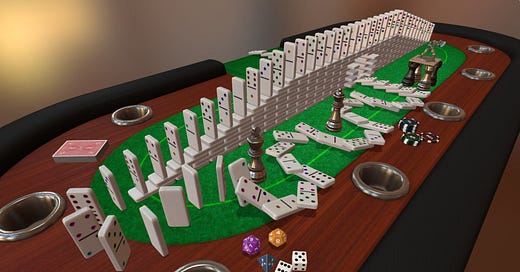John Palmer’s insightful piece on the benefits of simulating the spatial relationships of our familiar physical world in software opens with a surprising statement: “there is no app that replicates a deck of cards.”
Upon searching the app store on your phone, you’ll find that his claim is basically correct. There are obviously tons of apps that attempt this feat, but none of them approach the versatility of a true deck of cards existing in our three dimensional world. There are programs which attain and exceed the functionality of a physical deck of cards, however, even though they aren’t especially functional on mobile phones.
Tabletop Simulator fulfills all of Palmer’s requirements for a true ‘deck of cards’ simulation. You can cut the deck, deal cards, stack cards in any different number of piles, reveal cards, to all the players or just to specific players, and lay the cards in any arrangement for any desired card game. What’s more is that you can simulate almost any board game with the same degrees of freedom and functionality as our physical world. You can even flip the game board in a rage and cathartically watch the pieces fly around the room.
Tabletop simulator is already a great way to hang out with friends. Everyone can see each other’s hand-cursor, draw on the board, fight over pieces, and build things together. VR and motion tracking tech are on the precipice of being advanced and cheap enough to place your avatar in a room with your friends, sitting around a table and playing a board game together. Interacting with this spatial interface will feel natural, expressive, and the conversations you have sitting around a virtual deck of cards will feel close and connected.
The benefits of a more familiar and spatial virtual world will extend beyond improved entertainment and online social connection, however. Even though the existing spatial interfaces that are available to people fall short of a fully featured virtual space, they are already being used as venues for expression that is strictly policed in the physical world.
The Coronavirus pandemic struck Hong-Kong in the midst of its pro-democracy protests last summer. Public health justified strict government control of public space in the physical world. Large protests were not allowed and thousands of people were arrested for violating these rules.
Despite it’s cutesy aesthetic, Animal Crossing: New Horizons provided a refuge for protestors to spread their message while avoiding the control of governments. According to Joshua Wong, a leader of the pro-democracy movement in Hong-Kong “Animal Crossing is a place without political censorship so it is a good place to continue our fight.” Videos and pictures of people participating in Animal Crossing protests have tens of millions of views and “Even lawmakers in Hong Kong are playing [Animal Crossing].”
Speech in Animal Crossing is more protected from suppression because it is embedded into a physical space; it isn’t just text with a timeline. As software gets more spatial, it will open new avenues for expression of all kinds online. Whether it is playing a board game with friends or protesting an oppressive government, embedding our virtual selves into a virtual world with more dimensionality will make our online interactions more impactful, more real, and harder to destroy.





